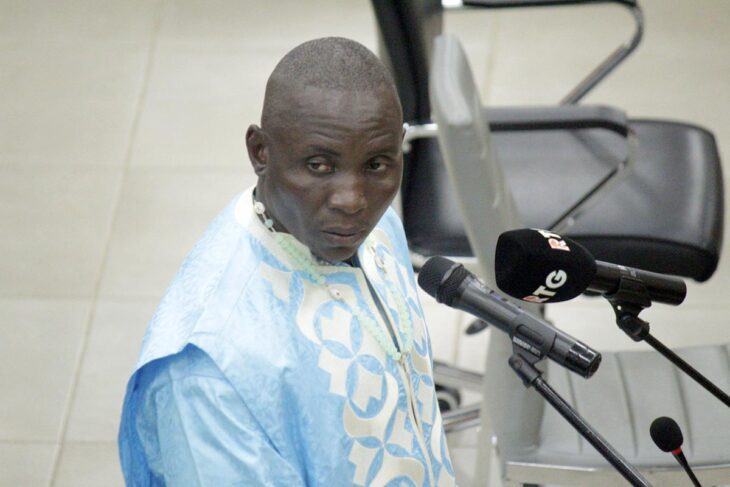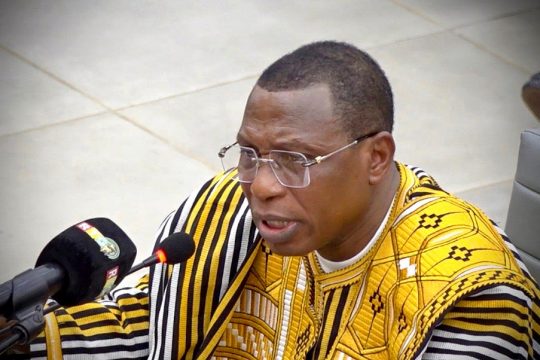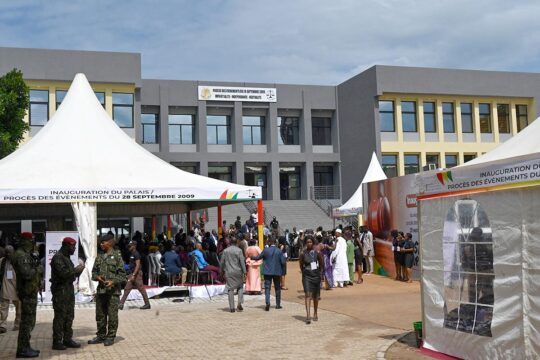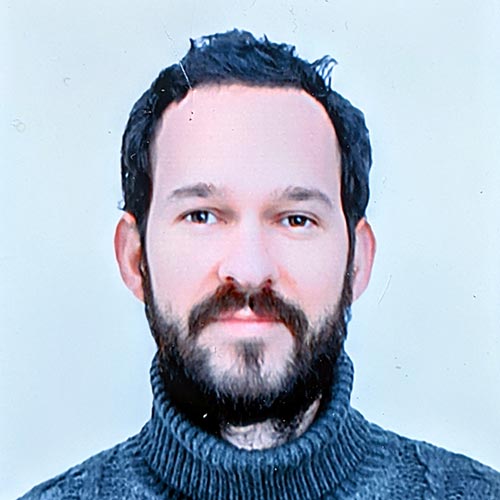On July 10, as hearings resumed in the September 28 massacre trial, an arm was raised in the dock. It was that of Marcel Guilavogui, nephew and former bodyguard of Moussa Dadis Camara, who was head of the military junta in power at the time. Guilavogui has been in detention for 13 years. Several witnesses formally recognized him as having been at the Conakry stadium, shooting into the crowd and beating up some political leaders during the bloody repression of an opposition rally. He has always denied he was there. In October 2022, when he was first heard by the court, he even claimed that he was in bed on September 28, 2009, convalescing after a road accident. This time, he said he wanted to "tell the truth about the September 28 event", and admitted he has kept "silent" until now.
As the trial was due to resume after a month and a half suspension with the appearance of the civil parties, the president of the court reopened the debate, questioning the various players in turn.
The prosecutor and civil parties were in favour of a new hearing for the accused. Among the defence, which is more divided than ever, opinions were split. Lawyers for Camara's aide-de-camp at the time Aboubacar Diakité, known as "Toumba", were in favour of Guilavogui's return to the stand. "When the time for truth comes, you have to let it out," said lawyer Paul Yomba Kourouma. Dadis Camara's lawyers were vehemently opposed, while there have been press reports over the past two weeks of tensions between the former head of state and his former protégé. "If you decide to hear Marcel, which would be catastrophic for everyone, bear in mind that other defendants will also want to speak,” lawyer Pépé Antoine Lamah argued, addressing the court president. “Under these conditions, we'll be going round in circles, and this trial will last forever.”
The president decided, and the accused stepped forward in his elegant turquoise boubou.
Dadis Camara's "parallel guard”
Guilavogui delivered a lengthy opening statement that lasted until the next day. He drew on notes, improvised and sometimes simply read what was written. He apologized "to the people of Guinea" for his “silence”, of which some people have taken advantage, he claims, to “paint [him] black". He says he was the victim of intimidation to prevent him from "reporting the real facts". His comments were rambling, but to everyone's surprise, he implicated Dadis Camara.
According to him, it was indeed "Dadis" who "planned" and "ordered" the killings that left over 150 people dead. The massacre was perpetrated by his "parallel guard". And he gave a definition: "These are men who are soldiers or civilians that an authority puts in place for its own secret missions, to exercise its power, by camouflaging itself. This parallel guard is not like the real guard, the one known to the people." And he named its main leaders, including Joseph Makambo, Gono Sangaré, and Beugré. These personalities had already been cited by some of the accused for their participation in the bloody repression. But while the investigation has highlighted the leading role played by Guilavogui, suspected of having led a group of soldiers to the stadium, the defendant is trying to remove this image. He recounted how he was ousted from the inner circle of power just a few months after the coup d'état that allowed Dadis Camara to seize the presidency. The head of state began to work exclusively "with his parallel guard", he told the court.
On the morning of September 28, 2009, he went to see the president, he says, because he hadn't seen him for several days. "I heard a loud, uncontrolled cry of anger from Moussa Dadis Camara," Guilavogui continued. He said the president was “surrounded by his new force, his parallel guard” and, with an opposition rally planned that day against his possible candidacy in presidential elections, addressed them thus: "What are you doing here, we have to subdue them! Who are these leaders not to obey the authority of the State?”
The president's bodyguard would then have preferred to go home. "I asked myself, 'is this the man we've chosen to be president?’ I was disappointed," says Guilavogui.
"The man before you is a saviour!"
Guilavogui told how he saw Dadis Camara's motorcade leaving the presidency for the city, and then learned that Toumba had also left. He decided to go to the stadium. There, he saw "Commandant Toumba, Colonel Tiegboro, Beugré and his group". "Even Makambo, I recognized him because of the little axe he always carried.” Just before entering the stadium, he said he heard "gunshots". He stayed inside for "fifteen minutes", but "didn't see any bodies, because it was just the beginning".
But listening to his account, the prosecutor became impatient:
“Monsieur Marcel, it has been said here that the Presidential Guard committed this massacre, and you were part of the Presidential Guard. You were also at the stadium on September 28. You were seen. Can you tell this court that you did not take part in this massacre?”
“I didn't kill, wound or rape anyone at the stadium,” came the reply. “The man standing before you is a saviour!”
Yet he struggled to explain to the court why he pulled out a grenade in front of the Ambroise Paré clinic, where some of the injured leaders had been admitted for treatment. According to several witnesses, it was Colonel Tiegboro, also accused in this trial, who took them to the health centre. Guilavogui’s version is different. "As soon as he got out of [his pickup], I accosted him and said you're under arrest. You misled Dadis! You've ruined the leadership!" Guilavogui recounted, saying one of his men then pointed a gun at him. "I had to defend myself. I took out my grenade. I only had one grenade, Mr. Prosecutor. Everywhere I went, I took it, even in the shower.” The audience burst out laughing.
This new hearing, which had raised so many expectations, ultimately left many questions unanswered. It was his word against that of the other defendants. "Tell me, was it you who were alone in your vehicle, according to your version, or those who drove the leaders to the clinic that tried to save them? Do you really think we can believe your version here?" asked Alpha Amadou DS Bah, lawyer for the civil parties. "Your story got off to a good start. You confirmed everything Toumba said about Captain Dadis, but why won't you help the court and tell us exactly what you did?" On the stand, Guilavogui exploded with anger. He stopped speaking into the microphone, and we could only half hear what he was saying. Then he went silent.








